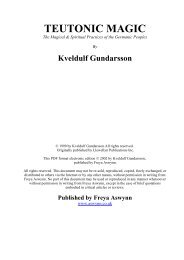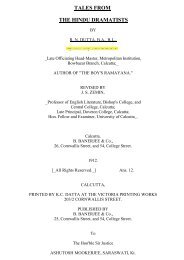Untitled - Awaken Video
Untitled - Awaken Video
Untitled - Awaken Video
Create successful ePaper yourself
Turn your PDF publications into a flip-book with our unique Google optimized e-Paper software.
Chapter 5. The Underworld 129<br />
into the community. If wergild was not paid for some reason, or if the crime was too<br />
serious to allow for reintegration of the criminal into the community after payment,<br />
then a sentence of outlawry was commuted, which basically condemned the outcast<br />
to the wastelands outside the bounds of society, and the price of the wergild was<br />
removed from his own “head” at the same time which essentially condemned the man<br />
to death. He literally was free to be killed. If the term of outlawry was survived,<br />
the crime had been paid for, and the former outcast was re-enfolded into society.<br />
There were certain deeds which could not be atoned for in this life, and, therefore,<br />
greatly affected life, in the Germanic way of thinking, as it continued in the<br />
Underworld community. These were the betrayal and breaking of a formal oath<br />
to a comrade, friend, relative, or king, or the killing of a relative since wergild<br />
could not be paid within the same family. 25 (Note: the payment of wergild was<br />
an agreement between families, a negotiation.) A family could not pay itself for<br />
something it had done to itself; this is no payment at all. In these cases, after<br />
death, the individual was outlawed by members of the ancestral community in the<br />
Underworld which meant banishment to the northern wastelands, the Niðstrond.<br />
He was considered unfit to live within family or community, and being deprived<br />
of family, companions, or a means of sustenance, there was only suffering, but no<br />
death or end to it all. Punishment after death in the Northern sense, then, is not a<br />
judgement or proclamation of the Gods, it is simply being rejected by the family/<br />
community.<br />
The Underworld was viewed as a primary source of energy for the land, the community<br />
and the family, but it was also the source of power/ luck for the individual.<br />
Luck or the individual’s or the family’s source of personal power flowed out from<br />
the Underworld and was disseminated throughout Midgard and the upper worlds<br />
as the result of an individual’s actions. One of the individual’s roles in life was to<br />
function as a distributor for that power, for the Waters of Life.<br />
According to tradition, there were three personal connections to the Underworld:<br />
the hamingja, the fylgja, and the body. Names for these connections exist or existed<br />
in traditions from other cultures as well usually associating the hamingja with the<br />
ancestral line, the familial connection to the source of power/ luck, the fylgja as an<br />
individual spiritual connector or guardian spirit, and the body or body/ soul complex<br />
as being fed bilaterally from the land (physical body) and the Underworld (ON hamr<br />
= “moldable spirit pattern for the body-shape”). Also, according to tradition, these<br />
25 Wergild involved terms of payment of a price prescribed by the existing legal system for<br />
physical damage caused to an individual. The terms of payment were agreed upon in front of<br />
witnesses by the families of the individuals involved. Payment of the wergild restored the individual’s<br />
rights under the existing legal system. It should be noted, however, that restoration of rights<br />
legally was not the same as restoration of social standing in the eyes of the community. Foote and<br />
Wilson discuss this system in depth in their The Viking Achievement . . .
















